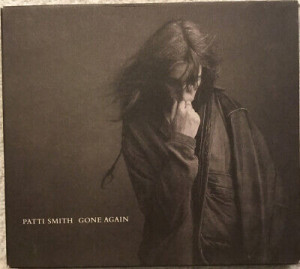Published on Aug 10, 1997
Give Patti Smith’s album
Gone Again the critic proof award of 1996. Although this
album was still wrapped in cellophane, I knew I had to respect how
the album came about. For critics who thrive on sympathy, Smith
lost her husband and her brother in the same year. For other
critics, it’s a new album from the high priestess of punk. How
could you dis an artist who fluidly brought beat poetry, punk and
raw feminism into two classic albums,
Horses and
Easter?
When all is said and done though, the content of the album is
what will endure. And luckily for us, Patti Smith does have
something to say with
Gone Again. The album is a quiet, burning eulogy to her
husband Fred “Sonic” Smith, but it never sinks into self-pity.
The album kicks off with one of the last collaborations Smith
did with her husband, “Gone Again.” It’s one of the two hard
rockers on the album. Smith wisely doesn’t try to recapture her
wild, unrestrained fury of “Rock And Roll Nigger”; instead she
comes off as a scarred warrior. “I have a winter’s tale/how vagrant
hearts relent prevail”, that line lays the theme of the entire
album.
“Beneath The Southern Cross” is more like the tempo of the rest
of the album. With the help of her old band member, Lenny Kaye,
“Southern Cross” is a beautiful acoustic piece. The music
background is miminal and organic part due to producer Malcolm
Burn, who produced Midnight Oil’s hugely overlooked gem
Breathe last year. While the music takes a back seat, Smith
lets her lyrical poetry loose. No one I know could say “equatorial
bliss” as gorgeous as Smith can.
Fred Smith is not the only artist that Smith mourns over in
Gone Again. In “About A Boy”, Smith pays tribute to Kurt
Cobain. I thought this song would sink the album. Clocking in at
close to nine minutes, and after a flood of Cobain tribute songs by
other bands, I thought that this would just become another “tribute
song”. The distorted, airy feedback of the guitars and Smith’s
growls made the song seem a lot shorter than I thought. It also
contains one of
Gone Again‘s great moments, just as the song ends, there’s a
brief pause, and you can hear Smith take in a breath and sigh
softly. The effect is devestating.
Unfortunately, a couple of songs on
Gone Again don’t showcase Patti Smith’s talents as well as
they should. “My Madrigal” is a nice, but somewhat forgetful ode to
her husband. For as strong as a writer as Smith is, the chorus
“Oh..’til death do us part” is weak. In “Farewell Reel”, Smith
actually does the poet cardinal sin of rhyming “died” with
“cried”.
For the occasional lyrical slip up, Smith more than redeems
herself with a back to back display of nearly flawless beauty with
“Wing” and “Ravens”. In “Ravens”, a mandolin plays softly while
Smith sounds like an artist with a renewed purpose. While Courtney
Love may be the crowned princess of punk for the moment, Smith is
content as an elder stateswoman. Elder as in experience though, not
nostalgia. In her cover of Bob Dylan’s “Wicked Messenger”, Smith
turns the song into something that is all her own – sounding fresh
and alive.
Gone Again, for me, had to wait a year before I wrote a
review. It’s easy to get caught up in the drama of an artist making
a return after a long absence. It’s even more distorting when you
look at what Smith has gone through and accomplished. But take all
of that away, and you’ve got a geniunely good album that seems to
be a great bookend to
Horses.
Gone Again could have coasted on sympathy, but Smith sees
her loss as a change as natural as birth. “Death to the world/alive
I awoke”, she sings in “Dead To The World”. Let’s hope Smith’s next
muse won’t be as traumatic of an experience for her.
